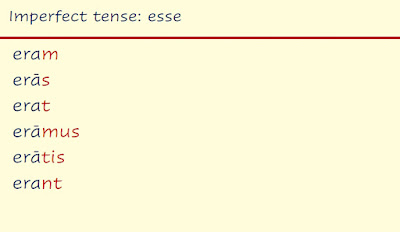https://en.wikisource.org/wiki/Latin_for_beginners_(1911)/Part_II/Lesson_XX
tense signs
Instead of using auxiliary verbs to express differences in
tense, like was, shall, will, etc., Latin
adds to the verb stem certain elements that have the force of auxiliary verbs.
These are called tense signs (also known as tense markers).
formation and inflection of the imperfect
The tense sign of the imperfect is -ba- / -bā-,
which is added to the present stem. The imperfect consists, therefore, of three
parts:
[1] present stem: amā-
[2] tense sign: -ba-
[3] personal ending: -m
> amā¦ba¦m
The inflection is as follows:
1st conjugation
amābam: I was loving / used to love
amābās: you (singular) were loving
amābat: (s)he was loving
amābāmus: we were loving
amābātis: you (plural) were loving
amābant: they were loving
2nd conjugation
monēbam: I was advising / used to love
monēbās: you (singular) were advising
monēbat: (s)he was advising
monēbāmus: we were advising
monēbātis: you (plural) were advising
monēbant: they were advising
Note that the ā of the tense sign -bā-
is shortened to -ba- before the personal endings -m, -t and -nt.
meaning of the imperfect
The Latin imperfect describes an act as going on or progressing
in past time, like the English past-progressive tense (I was walking).
It is the regular tense used to describe a past situation or condition of
affairs.
Exercises
arō, -āre [1]: plough
cūrō, -āre [1]: care for
desīderō, -āre [1]: desire, long for
dō, dare [1]: give
habitō, -āre [1]: live
labōrō, -āre [1]: work
laudō, -āre [1]: praise
mātūrō, -āre [1]: hurry
narrō, -āre [1]: tell (e.g. a story); recount
necō, -āre [1]: kill
nūntiō, -āre [1]: announce
parō, -āre [1]: prepare
portō, -āre [1]: carry
properō, -āre [1]: rush
pugnō, -āre [1]: fight
vocō, -āre [1]: call
dēleō, -ēre [2]: destroy
habeō, -ēre [2]: have
iubeō, -ēre [2]: order
moveō, -ēre [2]: move
videō, -ēre [2]: see
[1]
[i] vidēbāmus, dēsīderābat, mātūrābās
[ii] dabant, vocābātis, dēlēbāmus
[iii] pugnabant, laudābās, movēbātis
[iv] iubēbant, properābātis, portābāmus
[v] dabās, nārrābant, labōrābātis
[vi] vidēbant, movēbās, nūntiābāmus
[vii] necābat, movēbam, habēbat, parābātis
[2]
[i] you were having (sing and plur), we were killing,
they were working
[ii] he was moving, we were ordering, we were fighting
[iii] we were telling, they were seeing, he was calling
[iv] they were living, I was longing for, we were destroying
[v] you were giving, you were moving, you were announcing, (sing
and plur)
[vi] they were caring for, he was ploughing, we were
praising
[3] Niobe and her children (1)
fōrma, -ae, [1/f]: form, beauty
poena, -ae, [1/f]: punishment, penalty
potentia, -ae, [1/f]: power
rēgīna, -ae, [1/f]: queen
superbia, -ae, [1/f]: pride, haughtiness
trīstitia, -ae, [1/f]: sadness, sorrow
septem: seven
superbus, -a, -um: proud, haughty
nōn sōlum . . . sed etiam: not only . . . but also
Niobē, rēgīna Thēbānōrum, erat pulchra fēmina sed superba.
Erat superba nōn sōlum fōrmā suā marītīque potentiā sed etiam magnō
līberōrum numerō. Nam habēbat septem fīliōs et septem fīliās. Sed ea
superbia erat rēgīnae causa magnae trīstitiae et līberīs causa dūrae
poenae.
Notes:
[i] Erat superba …[1] fōrmā suā …
marītīque [2] potentiā … [3] magnō ¦ liberōrum ¦
[3] numerō │ she was arrogant … because of [1] her
beauty … [2] the power ¦ of her husband …
[3] the large number ¦ of children; the ablative case can be
used to express cause
[ii]
rēgīnae [dative] causa ¦ magnae trīstitiae [genitive]
│ a cause ¦ of great sadness ¦ to the queen
līberīs [dative] causa ¦ dūrae poenae [genitive]
│ a cause ¦ of harsh punishment ¦ for the children
[4] Niobe and her children (2)
sacrum, -ī [2 n]: sacrifice, offering, rite
verbum, -ī [2/n]: word
sedeō, -ēre [2]: sit
volō, -āre [1]: fly
interfectus, -a, -um: slain
molestus, -a, -um: troublesome, annoying (molest)
perpetuus, -a, -um: perpetual, continuous
Apollō et Diāna erant līberī Lātōnae. Eīs Thēbānī sacra
crēbra parābant. Oppidānī amābant Lātōnam et līberōs eius. Id superbae
rēgīnae erat molestum. “Cūr,” inquit, “Lātōnae et līberīs sacra parātis? Duōs
līberōs habet Lātōna; quattuordecim habeō ego. Ubi sunt mea sacra?” Lātōna eīs
verbīs īrāta līberōs suōs vocat. Ad eam volant Apollō Diānaque et sagittīssuīs
miserōs līberōs rēgīnae superbae dēlent. Niobē, nūper laeta, nunc misera, sedet
apud līberōs interfectōs et cum perpetuīs lacrimīs eōs
dēsīderat.
Notes:
Apollō Diānaque … sagittīs suīs … līberōs
rēgīnae … dēlent │ Apollo and Diana … destroy the queen’s children with
(by means of) their arrows; the ablative case is used to indicate the means or
instrument by which an action is performed



















